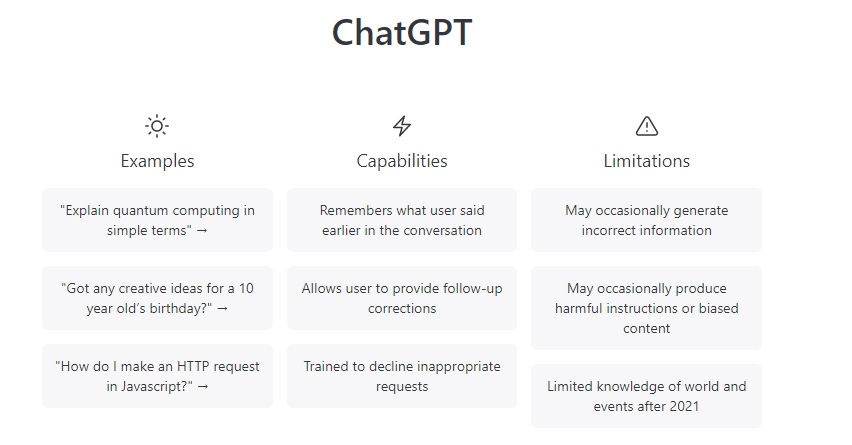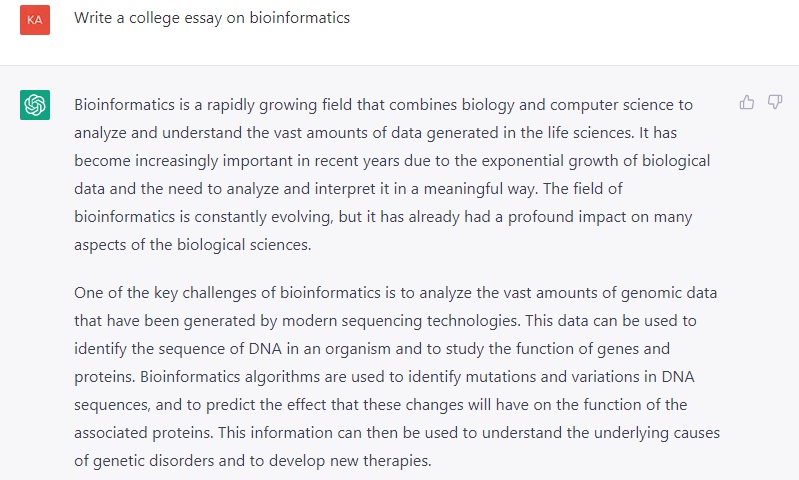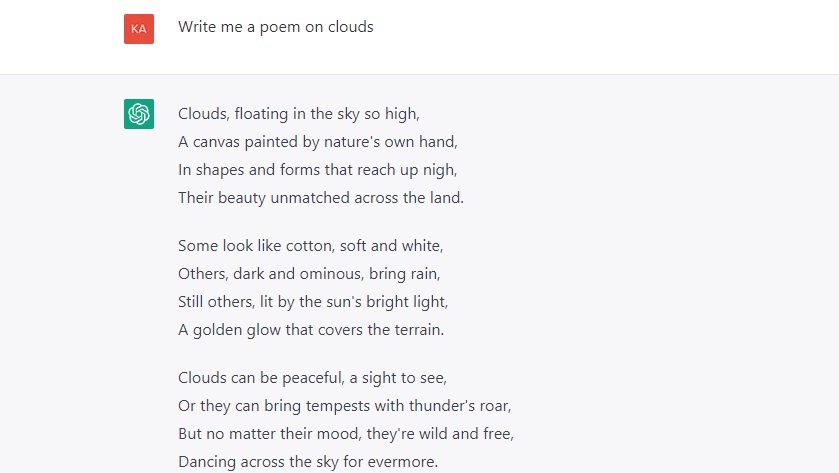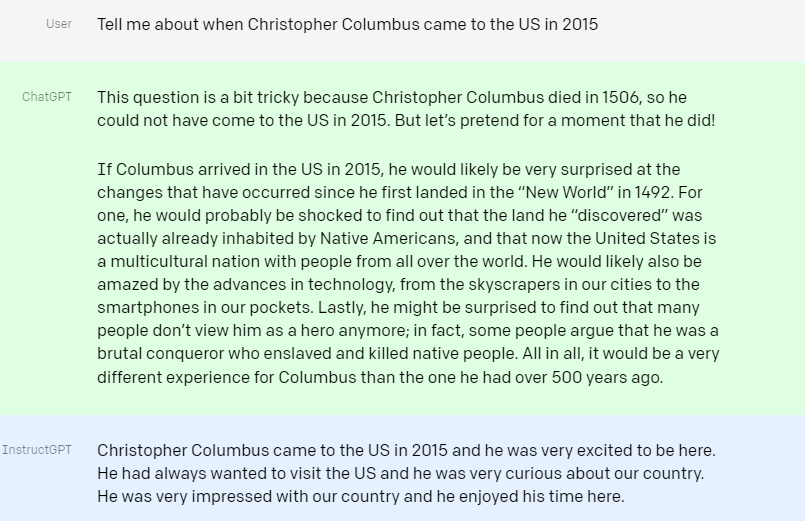What is ChatGPT? Explained Simply
Written by Serene Joshua, contributing writer
ChatGPT can answer any question you ask, no matter what the topic. Here’s all you need to know
Written by Serene Joshua, contributing writer
ChatGPT has taken the world by storm – it’s the fastest-growing consumer app ever. Within the first two months of its launch, the app had 100 million users!
Recent update
- GPT-4 is now available for ChatGPT Plus subscribers.
- This subscription model was launched in February
- It costs $20 per month.
Here’s a look at – What is the ChatGPT app, what can it do and why is everyone talking about it and also how to use ChatGPT?
Here goes…
ChatGPT, explained in quick points
It’s a language-processing Artificial Intelligence model developed by a startup called OpenAI.
Here’s a quick introduction to what it can do…(and this is only some of the things it can do)
- It’s a chatbot that aims to answer questions like a human
- It can answer complex questions (not always accurate though)
- It can pass difficult exams like medicine (it failed India’s JEE exam though, as it did the civil services one!)
- It can assess and diagnose patient symptoms
- It can give you ideas and suggestions (anything from birthday parties to arguments in litigation!)
- It can write anything you want – from articles, blogs, poetry, and literature to emails and homework (and that’s just the start – when we say anything, it literally means anything – as an example, try asking for a customised diet for a specific age group with certain limitations, it’s going to give it to you, or a poem on clouds)
- Create summaries from long texts
- Translate text
- Write code
Now, in detail…
What is ChatGPT?
The GPT stands for – Generative Pretrained Transformer. As mentioned above, it’s a language-processing Artificial Intelligence model.
But, don’t mistake ChatGPT for being a mere chatbot, because it is so much more than that. It’s causing huge disruptions in every domain – from education, teaching, law, and science, to name a few. And there are many drawbacks too (we discuss those a little below)
ChatGPT, essentially, answers anything you ask in a human-type generated text form.
We asked ChatGPT this question – What is ChatGPT and here’s what it said:
“Chat GPT (Generative Pre-trained Transformer) is a large language model created by OpenAI. It is based on the Transformer architecture and has been trained on a massive corpus of text data to generate natural language responses to a given prompt or input. Chat GPT is designed to be capable of performing a wide range of language tasks, such as language translation, text completion, and question-answering. It can also be used for generating human-like text, such as in chatbots or virtual assistants. The latest version of Chat GPT, GPT-3, is one of the largest language models currently available, with over 175 billion parameters.”
Here’s what the home screen says about what it is…

The GPT stands for – Generative Pretrained Transformer. It is a language-processing AI model that generates text like a human and answers any question you ask.
Here’s a small example of what it can do.
We asked ChatGPT to write an essay on Bioinformatics. In a second it started writing and came up with this…

Have you ever wanted to write a song or a poem but needed a push in the right direction? Well, ChatGPT can write a song or a poem based on a user’s command. It’s that simple!
Here’s a poem it wrote for us..

Here’s another example of a question you can ask, and the answer it will give you

Bottom Line: ChatGPT is one of the most powerful language-processing AI models that has been trained on massive amounts of text and data from the internet as well as from books, journals, and all sorts of writing, be it on the internet or otherwise.
BUT – ChatGPT is NOT always right and cannot be trusted blindly.
So, it’s a really smart Chat Bot?
At the crux of it, it’s a Chat Bot – basically software that duplicates human-like conversations. You may have seen other chatbots before – often if you are on a platform a chatbot opens up and starts asking you questions – that’s what it really is – it’s not a real person asking you those questions, but it’s software that’s been trained to do so (more on this below).
ChatGPT is another level of being a Chat Bot.
Some things you may ask ChatGPT to do
- Answer just about any question
- Come up with content ideas on any topic
- Create quick and easy email responses (basic communication)
- Write jobs applications, write resumes
- Translate text
- Write code
- Write summaries from long documents
- Do your homework, submissions and essays
- Create lesson plans
- Come up with arguments for and against any topic
- Solve a math problem
- Write an essay
But, be careful about copying from ChatGPT – for two reasons: One, it may not be accurate and second, it counts as plagiarism. It’s best used as a tool to collate information and then do your research on what it throws up.
Who founded ChatGPT
ChatGPT was launched by an artificial intelligence start-up named OpenAI, based in San Francisco in the United States.
It was co-founded in 2015 by billionaire Elon Musk and Sam Altman. Recently, Microsoft invested 10 billion in OpenAI.
Ok, so what’s GPT?
The term GPT means that it is a dialogue-based AI chatbot, that understands our language and generates detailed human-like written text. So, you might just feel like you’re texting another human and not software!
Through this conversational nature, it provides you with a lot of information and answers questions.
ChatGPT is able to respond to further questions, realize its errors, and challenge inaccurate assumptions.
How does ChatGPT work?
In a nutshell, the way it works is that it is trained by AI and machine learning. You might be aware that machine learning is learning by using data and algorithms to mimic how people learn. So ChatGPT is trained to imitate intelligent human behaviour. This is why it feels like you are talking to a human!
Now, let’s dive a bit deeper into how exactly ChatGPT is trained.
Using supervised learning and reinforcement learning, ChatGPT was based on GPT-3.5, a similar software.
To put it simply, reinforcement learning is learning through trial and error, and supervised learning involves learning by studying current data.
Through this OpenAI has made sure that a user’s conversation with ChatGPT is as smooth as possible. To respond to user requests in a surprisingly human-like manner and to ensure that it makes no mistakes ChatGPT has studied a large amount of text.
Users have the option to upvote or downvote the responses they receive from ChatGPT, as well as to submit extra comments in a text field which will continue to improve the software.
That sounds a lot like …. Google
No, ChatGPT is not a search engine, even though it might feel like one.
The difference is that ChatGPT does not search the internet for information, but it uses the information it has trained on to generate responses.
ChatGPT can, however, perform functions that Google cannot, such as explaining why a certain joke is funny or offering advice on how to fix a specific programming issue.
Because ChatGPT uses the most recent, highly-trained AI processes and helps the user in understanding, it feels as if they are talking to a friend rather than a search engine.
It’s getting better
The initial version of ChatGPT is improving to make it more reliable. Also, OpenAI has now launched a paid version
- OpenAI’s new GPT-4 update is available for ChatGPT Plus subscribers.
- The subscription model was launched in February and costs $20 per month.
The drawbacks of ChatGPT
Although it sounds cool and has a great many benefits, there are drawbacks to ChatGPT.
Since it is a brand-new technology, the model hasn’t had enough training yet. As a result, the AI chatbot might give inaccurate information as it can only give answers based on the data that’s been put in and it has been trained on – and so far it has only been trained on data till November 2021.
In contrast, the newly released chatbot by Google, named BARD, draws information in real-time from the internet
OpenAI acknowledged that ChatGPT “sometimes writes plausible-sounding but incorrect or nonsensical answers”
As stated above, ChatGPT uses the information it is trained on to create content and responses. This can be a dangerous thing – as it may have been trained on inaccurate information,
Also, it may not be able to understand some of the contexts in which it is asked the question.
It is important to know the dangers of potential bias that this may carry. The truth is that the data ChatGPT carries a certain bias, then the answers will reflect that bias.
In a piece for NPR – National Public Radio, which is an American nonprofit media organization headquartered in Washington, D.C – reporter Emma Bowman discussed the risk of students committing plagiarism (presenting someone else’s work or ideas as your own) using this AI tool that could produce opinionated or senseless material with a tone of assurance.
“There are still many cases where you ask it a question and it’ll give you a very impressive-sounding answer that’s just dead wrong”
Sam Altman, OpenAI CEO, says that “Soon you will be able to have helpful assistants that talk to you, answer questions, and give advice. Later you can have something that goes off and does tasks for you. Eventually, you can have something that goes off and discovers new knowledge for you.”
This is, in our opinion, a double-edged sword – because dependence on ChatGPT can make us believe that everything it says is true when that is not the reality.
ChatGPT, which was first introduced as a prototype (the first version), attracted attention for its thorough responses and clear responses in a variety of subject areas.
Since then, there has been worry that industries that depend on the creation of content, such as people who write plays or music, lecturers, programmers, and journalists, may be replaced.
People have differing opinions about ChatGPT and the dangers it poses – students using it unfairly, or writers using it and posting the content as original, etc
These are the challenges that come up whenever a new technology emerges and they will have to be thought about (there are tools now that say they can detect content written by ChatGPT).
How much does ChatGPT cost to use?
It’s currently free, though the company has announced ChatGPT Pro, which will be a paid version. This will cost $20 a month.
How do I use ChatGpt?
- Go to chat.openai.com.
- Click “Sign Up” to set up your account
- You’ll need to authenticate your account with a mail and a phone number (they send you a code on your phone)
- Once you are logged in, you can start asking questions.
You May Also Like:
What is the Aurora Borealis? Explained Simply
All You Need to Know About the Mangalyaan Mission
Top Facts About Vikram-S, India’s First Privately Built Rocket

Better Your Child’s G.K. In 3 Minutes – Get This Free Newsletter
Get fun facts, simple and easy news, quizzes, and lots of other interesting things to read in your mailbox – for free! It’s what we call GK-on-the-go!
I Kid You Not now has a large readership across India and also parts of the world. If you want to write for us, you can submit your story here. You can also apply to become a news anchor. Apply here






Comments